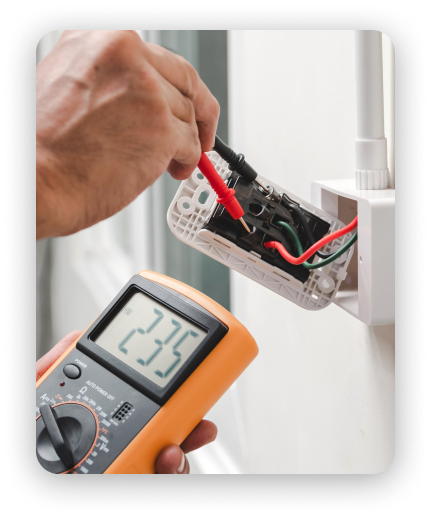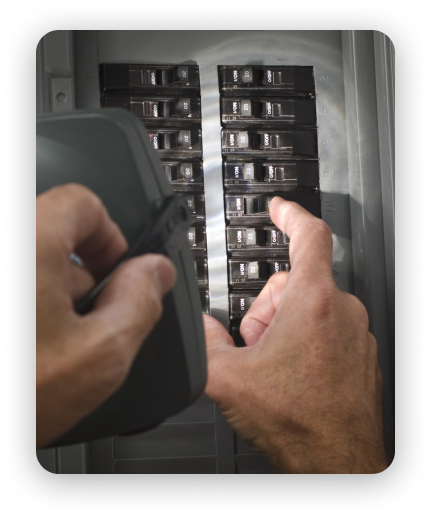Our reliance on technology has changed a lot over the years, and when it comes to maintaining a safe and efficient home, professional electrical services are key. At F.F. Hitchcock Plumbing, Heating & Cooling, we understand the importance of having industry experts handle your electrical installation service needs in Bethany, CT, and we’re here to help. Whether you’re building a new home, in the midst of a renovation, or simply in need of an upgrade, our team of qualified electricians can ensure that your electrical system is installed and operating at the highest standards, giving you peace of mind and a reliable source of power.
Electrical Installation Service in Bethany, CT
Call us for more details.

Comprehensive Electrical Installation Service in Bethany
It’s no secret that without electricity, our day-to-day lives quickly come to a halt. From our devices and appliances to our lighting and security systems, we rely on electricity for nearly everything. Proper wiring and lighting can prevent potential hazards, such as household fires and electrical shocks while ensuring that your electrical system operates efficiently and is compliant with local regulations.
Our expert electricians can help craft a plan that suits your home and its needs. We can install GFCI and AFCI technology to help improve your home’s overall electrical safety or a whole-house surge protector to safeguard your home in the event of an unexpected power outage or surge. Having a licensed electrician complete the electrical installation ensures that the job is handled safely and with care, so your family won’t be exposed to any safety risks, and your home will function better than ever.
If you’re living in an older home or your current system is struggling to keep up with your demands, upgrading your electrical system can be very beneficial. Not only can it improve your home’s energy efficiency, but it can also reduce your monthly electricity bills and increase the value of your property. You may consider the many benefits of installing smart home devices and touchless appliances to make your everyday routine more convenient. We can also rework your lighting scape for a more dramatic indoor effect or improved visibility. If you’re looking to adopt innovative technologies such as a tankless water heater or an at-home EV charging station, you can count on our team to ensure your home’s electrical grid is equipped to handle any increases in power supply need.
- Energy-efficient lighting and equipment installation
- Smart home devices
- Updated wiring
- New power panel installation with upgraded capacity
- Whole-home surge protector installation
- Tankless water heaters
- EV charging station
F.F. Hitchcock Plumbing, Heating & Cooling: Here for All Your Electrical Installation Needs
At F.F. Hitchcock Plumbing, Heating & Cooling, our experience in helping homeowners power their homes has seen its fair share of changes. That’s what happens when you’ve been serving the local community since 1870. But through all these years, one thing has stayed the same: our commitment to our customers. We truly care about your comfort and safety and work diligently to ensure that any electrical installation service that we provide in Bethany is carried out with the highest quality workmanship and a focus on customer satisfaction. Let us help you ensure your electrical systems are installed correctly and perform flawlessly.
Don’t settle for less—choose the experts at F.F. Hitchcock Plumbing, Heating & Cooling for all your electrical installation needs. Call us today! Also, check out our other electrical services!
Frequently Asked Questions

What are the benefits of upgrading my home’s electrical system?
Upgrading your electrical system improves safety, boosts energy efficiency, and can handle the demands of modern devices. This can lower energy costs, increase property value, and reduce the risk of electrical hazards.
How do smart home devices impact energy efficiency?
Smart home devices, like programmable thermostats and automated lighting, help optimize energy use by adjusting to your habits. This efficiency can lead to lower electricity bills and a smaller carbon footprint.
What is a whole-home surge protector, and do I need one?
A whole-home surge protector safeguards your home’s electrical devices from power surges, which can occur during storms or grid issues. It’s recommended for protecting sensitive electronics and extending their lifespan.
How can updated wiring improve home safety?
Updated wiring reduces the risk of electrical fires, eliminates potential shock hazards, and ensures that your system can safely handle today’s power needs. Older wiring often isn’t equipped for modern electrical loads.
Can an electrical panel upgrade support new appliances?
Yes, upgrading your electrical panel allows it to manage higher power demands from new appliances, ensuring efficient operation without overloading circuits or causing frequent breaker trips.
What are the advantages of installing energy-efficient lighting?
Energy-efficient lighting, such as LEDs, uses less electricity and has a longer lifespan than traditional bulbs, saving on both energy costs and replacement expenses over time.
Is it possible to install an EV charging station at home?
Yes, installing an at-home EV charging station provides convenience and cost savings on charging. A professional electrician will ensure your home’s electrical system can support the added load safely.
What should I consider when planning for a tankless water heater installation?
Consider your home’s power supply capacity, as tankless water heaters require significant electricity. A professional installation ensures efficiency and that your system can handle the heater’s demands.
Why should I choose a licensed professional for electrical installation?
Licensed professionals ensure that installations meet local codes, preventing safety risks like electrical fires and shocks. They also ensure your system functions optimally and safely for years to come.
What are GFCI and AFCI outlets, and why are they important?
GFCI outlets protect against electrical shocks in wet areas, while AFCI outlets prevent electrical fires by detecting and stopping arc faults. Both are essential for a safe and up-to-code electrical system.








